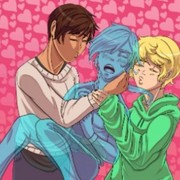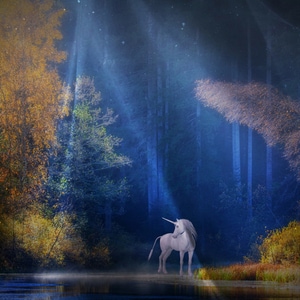At first he had thought of force. The morning after Janet’s disappearance he went to the Hall, where the Squire refused to raise the countryside and follow him into Faerie to storm the Dark Tower. It was only ever a faint hope. But Master Fuller had met him in the road afterward and clapped his fine-veined tailor’s hand upon the smith’s shoulder.
“Let there be no division between us on account of Janet’s loss, my son. Let me help you free her.”
No one else was foolish enough to follow them—no one except Ned, but he was still barely more than a boy, and John would not hear of his leaving their mother. Armed with the tailor’s old claymore and the long hunting-knife John’s father had made him as a boy, the two of them marched toward the castle at sunset. But here in Faerie two were no better than one, and two hundred could have been no more use, for as they began to climb the dell’s further slope to the tower’s foot, the fay-spell seized them and stopped them in place. This time the Witch did not bother coming out to them. This time they stood fixed in place until sunrise, when the tower vanished and they found themselves in the mortal wood.
John reconsidered. The second sunset he returned to the dell alone, holding in his hands six lines of nonsense scrawled across a scrap of birch-bark. That came from Goody Whitemare, whom he had always thought a fraud. Now, no doubt, she was going from house to house in the village boasting that she had sold him a charm. But he was desperate.
“White magic,” she had chuckled, handing him the piece of bark. “Sovereign remedy against fay-spells. Say that, and you’ll have your love in your arms in a twinkling.”
John had squinted at the words, a foolish doggrel verse commanding false spirits in the Name of the Trinity. That seemed to him close to blasphemy, and he almost dropped it under his heel and ground it into the mud. But then he saw the name of one of the spirits.
Zachiel. The Witch’s familiar.
So he had paid Goody Whitemare and set off, coming to the dell with last light as the forest slipped into Faerie. When the shadow of the Dark Tower rose above him, John repeated the words of the charm, but this time the fay-spell took him as soon as the words left his mouth, even before he had advanced on the castle.
There was nothing to do but wait and rage.
He might have known! He might have known he could never use the enemy’s own weapons against her. But if not this, then what weapon would serve him? Oh, God, what weapon would serve him now?
John waited, stiff and despairing, while the clouds flocked across the face of the moon. At last, in the dark hours before dawn, his mind wandered and he began to dream with his eyes open.
In the dream he was able to move. He wandered through nightmare landscapes in which that dark tower and that leprous moon rode his brow like a burden. He made toward them, but no matter how far he travelled, though he walked until his shoes fell to pieces and the thorns and brambles tore his clothes, though he walked until his hair grew white and the hands before him withered to spotted age, never could he close the distance between the tower and himself by so much as a footstep.
In the midst of this nightmare he heard a horn-blast. In the midst of the withered forest he saw a flash of white.
It pounded through the trees toward him, goat-footed, horse-maned, one-tined. The hunting-horn was joined by other cries and John recognised the baying of hounds. The Unicorn stumbled, its snowy flank stained with blood, the dogs nipping at its heels … Before him, in the sheltering nook of a hedge of brambles, the beast turned to face its pursuers with its feet wide-planted. Down went its horn, and there was an agonised yelp as in one fluid movement it gored a hound and tossed it aside. Even with that motion, however, another of the dogs leaped up and got its teeth in the Unicorn’s arched and silvery neck.
Still, it was a savage and desperate beast, and it bit and kicked and gored its persecutors until something fled across the field of John’s vision and an arrow took root in the Unicorn’s shoulder. He turned his creaking old neck and saw the lithe and graceful figure of a woman standing at the top of a slope a little way off. In the moonlight it was impossible to see more of her than her white tunic and the sudden curve of her short bow, to which she had already fitted and now loosed another arrow. Another followed, and another; still, it took five wounds before the beast vanished under the teeth of the dogs. In another moment all that was visible of the fabulous creature was blood—blood shining curiously red in the chancy moonlight, while the blood of the hounds, by contrast, seemed black.
John felt a pang of sorrow at that butchery, but asleep or awake, there was nothing he could do but watch. A huntsman—one of the woman’s attendants—ran down the slope, shoved the dogs aside, and with a few shrewd slashes and digs parted the Unicorn’s head from its neck. Swinging it a little by the horn, he ran back up to the huntress at a springy lope, while the hunting-horn blew to recall the hounds…
At last, silence fell. John ached inside and out, and the Tower was still far off. Instead of pressing on toward it, he hobbled his dream-aged bones closer to the wreck of the Unicorn. Its blood lay thickening on the ground among a medley of worried bones and hoofs, red like pigeon’s blood, red like rubies.
There was a flash of the same colour in the midst of the thicket before him.
He could not remember if it had sprung up from the Unicorn’s blood, or whether it had been there from the beginning of his dream. It was a rose, red as blood, ripe and full-blown, offering its heart to the world. But instead of yellow stamens growing there, John saw a smooth white pearl resting in its centre.
He reached out a trembling hand to touch the petals, and before his eyes his gnarled and wrinkled claw returned to youth. In the same instant he found he could stand upright, and the tower seemed less leaden on his horizon. He took out the knife on his belt and carefully, so as not to scatter the heavy petals or spill the pure jewel, he parted the flower from its stem. Then, holding it before him like a torch, he went on to the tower.
Now he walked toward it with a step as light as thistledown, and his stride ate up the distance. Now he reached its foot and scaled the stair at its side. Now he touched the flower to the door and it slammed open like a trumpet-blast.
Now Janet herself came out to him, alive and unaltered, shining like the fair and silver moon, brave and blithe as ever she had seemed to him in the days before she went into Faerie…
In the fraction of a moment of windmilling panic, the dream vanished. Cool earth hit him in the face and he smelled the sweetness of rotting leaves.
John pushed himself off the ground and found himself lying in the dell in the forest on a cool summer’s morning. The sun had just risen, burning through the fine strands of mist that yet clung in the hollow. And blackbirds were singing. On such a morning once he would have rejoiced with the rest of the world. But now, he reeled to his feet and reached out desperately to the vanished fortress.
“Janet!” he cried. “Janet!”
It was only a dream. She was gone, and to see her in all her loveliness and to recall for a moment the love he had felt for her before he learned to doubt her was a crueller blow than if her very image had been blotted from his mind. And what now? Where now? He was no nearer the tower than before.
In the midst of his grief the thought of home and the forge and the day’s work called to him like a candle put in the window for a winter traveller. But as he waded home through strands of fog, the remembrance came back to him of the thing which he had used in his dream to enter the tower.
The rose with the pearl lying at its centre.
That was what he needed. A spell to break all spells, not the foolish mutterings of an old woman in the village. But where should he find such a thing? Not in England, for a certainty.
Not in England. But perhaps in Faerie…?
John stopped walking. Shafts of sun coming from behind him struck diamond-glinting shards of light from ferns and grass. Overhead the trees rose immense and solid; in their dim canopies the shadows of night still clung and shrunk under every leaf.
In the morning hush the birds sang jubilation from a cloudy darkness of leaves.
Each moment left its footprint on his mind, so that forever afterward he could remember the shape of each tree, the quality of the light, and the sighing of the wind as it was at the moment that the thing came and stood very simply and unavoidably before him.
In Faerie grew such sweet flowers. He must go into Faerie and find one.
It was so simple and so clear to him what he must do that when he moved on again, there was almost a swing in his step.











Comments (0)
See all